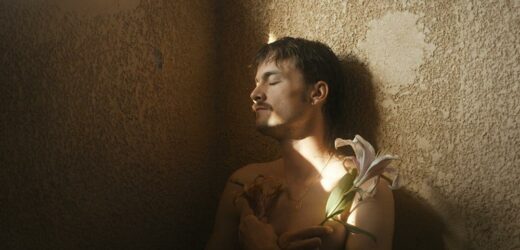To the exuberant tones of Christophe’s “Aline,” lamenting the loss of his love, two shirtless men rejoice orgiastically as water tumbling down a rock face drenching their bodies. Meanwhile, at a country house, maids and a gardener, dressed in period costume, proudly pour what looks like a mixture of water and milk onto plants.
The scenes, it seems, are from a libertine costume drama, being shot in the wooded French countryside. Then suddenly Valentin, the director, disappears. Clodhopping local cops interview the crew; some time later, Robin, the film’s DP and Valentin’s lover, travels to the Pacific-shore Mexico to fulfil a promise.
Sensual, sexual, playful, genre-blending and very meta, “De Noche los Gatos Son Pardos,” winner of Locarno’s 2021 First Look on Swiss Cinema, world premieres later this week in international competition at the Locarno Film Festival. Picked up for world sales by Italy’s Open Reel in the run-up to the Festival, few films buck more norms of popcorn movie entertainment:
Everyone Gets Lost
In mainstream movies, the hero accomplishes a goal. In “De noche los gatos son pardos” everybody gets lost. “Valentin, the director, disappears; the police never solve the mystery. The undertakers get lost in the forest, Robin, the cameraman and director’s lover, gets lost in the Mexican jungle,” Merz observes. “Many of the plot points which we had to hit were clear before we shot, but the things that happened in between them we figured out during the shoot. If Valentin’s disappearance is a mystery to the police, then it should be a mystery to me as well, says Merz.
A Democratic Sexuality…
In traditional movies, the hero, but often just the hero, gets his end away. In “De Noche,” almost everyone gets a bit of the action, but not always how the audience might think. In same sex scenes, Valentin the film director has a thing for finger (and occasionally toe) sucking. The film may be the first in history where a character pleasures themself with an accordion. “I wanted the actors and their characters to have space to experimentally engage with their own desires. ‘De Noche…’ acknowledges the importance of sexuality in most people’s lives and tries to look at this film set lovingly and with humor,” Merz has commented.
….and Story Line
At “De Noche’s” get-go, the film appears to turn on Valentin’s battle to make a movie in which much is left to actors’ inspiration. Then he disappears, and other characters take central stage. An investigating policeman, engaging but befuddled, then two undertakers, who seemed destined for just a walk-on role, but dominate part of the film’s later stretches. Then Robin takes over, and the film changes tenor once more from a comedy of officialdom to a high-voltage love story. “I wanted to make a film where I could host very diverse elements, very different from each other, and where one character has the lead for a while but then another story and a new protagonist takes over. Each “main” character is connected to a different universe or genre. So Valentin’s world is erotic, the inspector’s a murder mystery and Maxi, one of the actresses, creates a zombie world,” Merz told Variety.

And a Democratic Cast
Many directors use non-pros, but few with such a rangers “De Noche’s…”: a farmer from the Limousin region of France; asylum seekers from Mauritania; an actor from the world of ethical pornography; classically trained film and theater actors; as well as Muxhes from the Istmo de Tehuantepec region in Oaxaca, Mexico.
Abolishing Hierarchies
Merz quotes and has been inspired by philosopher Félix Guattari who said that in order to heal a patient in a psychiatric hospital, you first need to heal the institution. “One of the main problems is the hierarchical structure. Patients need to become empowered by having more responsibilities. He suggested a new approach where patients would cook for their caretakers, drive them around, clean up for themselves and stage theater.” From Merz himself, playing Valentin, to DP Robin Mognetti as his lover Robin, most of film’s crew also played roles in front of the camera. “It’s drawing on the knowledge of the people and asking them if they feel like they can do something, and if they say ‘yes,’ they do it. “ Merz said, citing the case of a Muxhe actress who did the makeup for a corpse in the film. “It was as good as the makeup you could expect from a professional make-up artist.”
….And Industry Stereotypes
Audiences are now so cine-literate than they can sense the industry scale of most films they’re watching, from shoestring indie to big arthouse or low-fi sci-fi. Some films of course will still throw them. For much of its going, “De Noche…” weighs in as contained arthouse, shot at one location and its environs in remote Limousin. When the movie almost seems done, it suddenly switches to Mexico, however. Merz lived as a graphic designer in Mexico in 2007, and always wanted to shoot part of his film there, he says. “As a producer, I’d never say something wasn’t possible.” The Oaxaca shoot in Mexico only required Merz and Mognetti to travel for a finale which blends plush magical and social realism as it lifts off in romantic terms, revealing yet another facet of the film, as a full-on love story.

Read More About:
Source: Read Full Article


